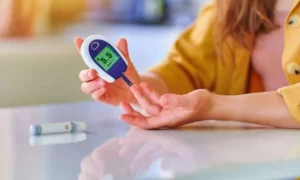This blog aims to explore the vital role of glucose in our bodies and how understanding and managing its levels can significantly impact our overall well-being. Glucose, often referred to as the body’s primary source of energy, plays a crucial role in various bodily functions. Here, we will discuss who needs glucose treatment, and effective treatments to maintain optimal levels. Whether you’re managing diabetes, or simply aiming for a healthier lifestyle, this guide will provide valuable insights and practical tips for harnessing the power of glucose to promote a balanced and vibrant life.
Contents
Who Needs Glucose Treatment?
 Glucose treatment is primarily needed by individuals who experience low blood sugar levels, a condition known as hypoglycemia. While hypoglycemia can occur in people without diabetes, it is most commonly associated with individuals who have diabetes. Especially those who use insulin or certain oral medications to manage their blood sugar levels.
Glucose treatment is primarily needed by individuals who experience low blood sugar levels, a condition known as hypoglycemia. While hypoglycemia can occur in people without diabetes, it is most commonly associated with individuals who have diabetes. Especially those who use insulin or certain oral medications to manage their blood sugar levels.
Here are some groups of people who may require glucose treatment:
- Insulin Users: Individuals who use insulin to manage their diabetes are particularly susceptible to hypoglycemia. Insulin helps lower blood sugar levels, but if the dose is too high or not balanced with food intake and activity, it can lead to low blood sugar.
- Some Oral Medication Users: Certain oral medications are used to treat diabetes. As sulfonylureas and meglitinides, can stimulate the pancreas to release more insulin, potentially causing hypoglycemia if not coordinated with meals and activities.
- People with Other Medical Conditions: Individuals with medical conditions that affect glucose metabolism or hormone regulation, beyond diabetes, may also experience hypoglycemia. This includes disorders of the liver, adrenal glands, or certain tumors that affect insulin production.
- Children and the Elderly: Children with diabetes, especially those who may not be able to communicate their symptoms effectively. The elderly, who may be more prone to medication errors or fluctuations in food intake, are at increased risk of hypoglycemia.
- Athletes and Active Individuals: People who engage in intense physical activity. Particularly if it’s not adequately balanced with food intake and insulin adjustments, may experience hypoglycemia. Athletes and those with active lifestyles need to manage their blood sugar levels carefully.
Individuals with diabetes need to work closely with their healthcare team to establish a personalized diabetes management plan that minimizes the risk of hypoglycemia.
What Are Some Medical Glucose Treatment?
Medical glucose treatments are interventions used to manage low blood sugar levels (hypoglycemia) in individuals with diabetes or other conditions. It’s important to note that these treatments should be used under the guidance of healthcare professionals. Here are some common medical glucose treatments:
Glucose Tablets or Gel
Glucose tablets are a handy option for managing hypoglycemia. They typically contain a specific amount of glucose, making it easy for individuals to calculate and control their carbohydrate intake. The tablets can be quickly chewed and swallowed, and they are a convenient choice for carrying in a pocket or bag. Glucose gel, available in tubes, is another alternative that allows for rapid absorption through the mouth, making it suitable for individuals who may have difficulty chewing or swallowing.
Glucose Drinks
These drinks or solutions are designed for quick absorption and are readily available in the market. These beverages contain a predetermined amount of glucose, and their liquid form facilitates faster entry into the bloodstream. They are particularly useful when a person needs a rapid increase in blood sugar levels.
Glucagon Injection
Glucagon is a hormone that triggers the release of glucose from the liver, raising blood sugar levels. Injectable glucagon is used in emergencies when an individual with diabetes experiences severe hypoglycemia and is unable to consume oral glucose. Family members or caregivers are typically trained to administer glucagon through a pre-filled syringe or auto-injector in case of an emergency.
Dextrose Intravenous (IV) Solution
 In severe cases of hypoglycemia, especially when the person is unconscious or unable to take oral glucose, healthcare professionals may administer dextrose directly into the bloodstream through an intravenous (IV) line. This method provides a rapid and controlled increase in blood sugar levels.
In severe cases of hypoglycemia, especially when the person is unconscious or unable to take oral glucose, healthcare professionals may administer dextrose directly into the bloodstream through an intravenous (IV) line. This method provides a rapid and controlled increase in blood sugar levels.
Intramuscular (IM) Glucose
While less common, intramuscular administration of glucose may be considered in emergencies. Glucose is injected into the muscle, allowing for absorption into the bloodstream. However, this method is typically reserved for situations where other routes of administration are not feasible.
Glucose Nasal Spray
Glucose nasal spray offers an alternative for individuals who may have difficulty swallowing or are unconscious. The spray delivers glucose through the nasal mucosa, allowing for absorption into the bloodstream. It provides an additional option for emergencies when other forms of glucose may not be practical.
People with diabetes should work closely with their healthcare team to determine the most appropriate medical glucose treatments. This should be based on their specific needs, health status, and the severity of hypoglycemia episodes. Regular communication with healthcare providers helps in optimizing diabetes management and preventing future occurrences of low blood sugar.
How Can I Manage Glucose Levels Naturally?
 Managing glucose levels naturally is an essential aspect of overall health, especially for individuals with diabetes or those at risk of developing diabetes. Here are some natural strategies to help manage glucose levels:
Managing glucose levels naturally is an essential aspect of overall health, especially for individuals with diabetes or those at risk of developing diabetes. Here are some natural strategies to help manage glucose levels:
Balanced Diet
A balanced diet is key to managing glucose levels. Emphasize whole, nutrient-dense foods that provide a steady release of energy. Incorporate a variety of fruits, vegetables, whole grains, lean proteins, and healthy fats. This approach helps prevent rapid spikes and crashes in blood sugar levels.
Portion Control
Controlling portion sizes is crucial for managing glucose levels. Be mindful of serving sizes to avoid overeating. This can lead to elevated blood sugar levels. Using smaller plates and paying attention to hunger and fullness cues can aid in portion control.
Fiber-Rich Foods
High-fiber foods, such as fruits, vegetables, whole grains, legumes, and nuts, play a vital role in glucose management. Fiber slows down the digestion and absorption of carbohydrates, resulting in a more gradual increase in blood sugar levels.
Regular Physical Activity
Regular exercise is a cornerstone of glucose control. Engage in aerobic activities like walking, jogging, or cycling to improve insulin sensitivity and help cells utilize glucose more effectively. Strength training exercises can also contribute to overall metabolic health.
Stay Hydrated
Water is essential for overall health, including glucose regulation. Staying well-hydrated supports kidney function and helps prevent dehydration. This further can affect blood sugar levels. Aim for an adequate intake of water throughout the day.
Limit Added Sugars and Processed Foods
Minimize the consumption of foods and beverages high in added sugars and processed carbohydrates. These can lead to rapid spikes in blood sugar levels and contribute to insulin resistance over time. Focus on whole, unprocessed foods instead.
Choose Healthy Fats
Opt for sources of healthy fats, such as avocados, nuts, seeds, and olive oil. These fats not only provide sustained energy but also contribute to improved insulin sensitivity. Avoid trans fats and limit saturated fats for better cardiovascular health.
Regular Meal Timing
Establishing regular meal times helps regulate insulin production and supports stable blood sugar levels. Skipping meals or irregular eating patterns can lead to fluctuations in glucose levels. Consistency in meal timing is especially important for individuals with diabetes.
Manage Stress
Chronic stress can impact blood sugar levels through the release of stress hormones like cortisol. Incorporate stress-reducing practices such as deep breathing, meditation, yoga, or mindfulness into your routine to promote emotional well-being and glucose balance.
Adequate Sleep
Quality sleep is essential for overall health, including glucose metabolism. Lack of sleep can affect insulin sensitivity and lead to disruptions in hormonal balance, potentially contributing to elevated blood sugar levels. Aim for 7-9 hours of quality sleep per night.
Remember, individual responses to lifestyle changes can vary, and it’s crucial to consult with healthcare professionals, especially if you have diabetes or other health conditions. They can provide personalized guidance based on your specific health needs and help you create a plan tailored to your circumstances.
Conclusion
In conclusion, glucose treatment naturally is crucial for overall health, especially for individuals with diabetes or those at risk. Adopting a balanced diet rich in whole foods, controlling portion sizes, and emphasizing fiber intake can contribute to stable blood sugar levels. Regular physical activity, staying hydrated, and choosing healthy fats further support glucose regulation. Consistency in meal timing, stress management, and prioritizing adequate sleep are essential components of a holistic approach.
It’s important to consult with healthcare professionals for personalized guidance and to create a plan that aligns with individual health needs. By incorporating these natural strategies, individuals can take positive steps towards maintaining optimal glucose levels and promoting overall well-being.
Do you want to get rid of diabetes? Join our online diabetes treatment program and reverse Diabetes naturally through lifestyle changes such as a Personalized Diet plan, Exercise, Yoga, dieticians, and health coaches.

